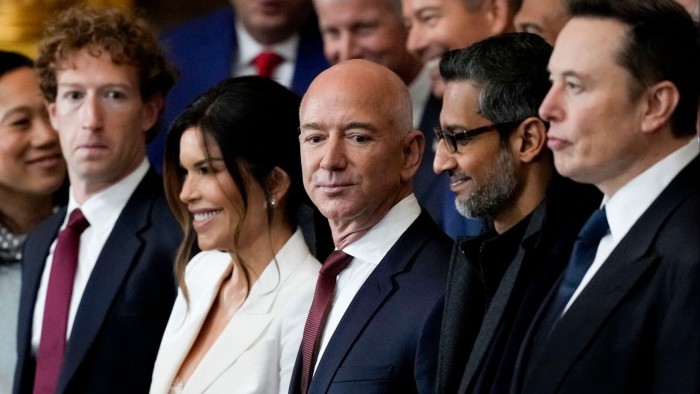Unlock the White House Watch newsletter for free
Your guide to what Trump’s second term means for Washington, business and the world
The writer is a senior fellow at the Ronald Reagan Institute, a 2025-26 Moynihan Scholar at City College and a former senior White House aide
At a recent White House dinner with chief executives, Donald Trump made a pointed comment to Google CEO Sundar Pichai: “Biden was the one who prosecuted that lawsuit — you know that, right?”
Google had been at the centre of one antitrust lawsuit in which a judge recently spared it from potentially dire consequences. While President Trump’s comment showed how central presidential leadership is to antitrust policy, Pichai’s presence at the dinner demonstrated his own recognition of the need to stick close to the president for the good of his company.
In recent years, America has undergone a shift in its approach to antitrust issues. The legal scholar and former US solicitor-general Robert Bork’s theory that huge size is OK as long as consumers benefit once dominated antitrust policy. No longer. Both Democrats and Republicans now seem sceptical of large corporations. Key policymakers are increasingly listening to aggressive antitrust advocates who, according to a study by Baron Public Affairs, support the expansion of antitrust “beyond consumer prices to fight anti-competitive behaviour”.
The history of corporate antitrust battles with Washington goes back well over a century. It has long been advisable for CEOs to pay attention to what happens in the US capital, although it took a while for this lesson to sink in. Even after the passage in 1890 of the Sherman Antitrust Act, Standard Oil’s John D Rockefeller and his team saw little reason to get involved in presidential politics. Rockefeller took his aide John Archbold’s advice to heart: “We do not think that much will come of the talk at Washington regarding trusts.” Archbold and Rockefeller were wrong. Within 20 years, the Supreme Court would rule in favour of the federal government breaking up Standard Oil.
Another chief executive who thought he could ignore Washington was the movie mogul Lew Wasserman. From 1946, he was head of MCA, Hollywood’s biggest talent agency, with aspirations to run a studio as well. Federal regulators, including Robert F Kennedy’s Justice Department, started looking into him and his business. In response, Wasserman dropped his apolitical approach and started befriending presidents, including John F Kennedy, Lyndon Johnson, Ronald Reagan, and Bill Clinton. This served him and his businesses well.
Bill Gates, co-founder of Microsoft, took a different tack. Like Rockefeller, he thought that his company was bigger than Washington, once saying that “our world works three times faster than normal business, and Washington works three times slower. That puts them behind by a factor of nine.” The ratio may have been correct but it failed to account for the fact that government was also much more powerful than business. When it sets its sights on a target, as the Clinton administration did on Microsoft, it was hard to shake loose.
Gates learnt this lesson the hard way as the Microsoft investigations of the 1990s set back the company and appeared to contribute to Gates’ decision to focus on his philanthropic efforts. Years later, Gates warned a young Mark Zuckerberg to pay more attention to Washington than he had, saying: “Get an office there, now.”
America’s evolving approach towards antitrust has led to an evolution in how chief executives interact with government. Understanding the history of this relationship can help to inform how the government’s increasingly aggressive view of antitrust policy might reshape the way they interact with Washington in the future.
The Google case and Trump’s warning to Pichai carry a simple lesson for chief executives. Working directly with presidents can’t persuade a judge or a jury to rule in your favour, but it can prevent the Justice Department from bringing a case against you in the first place.

